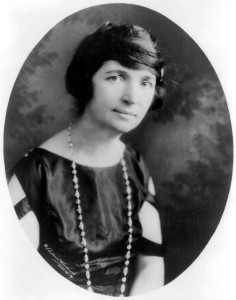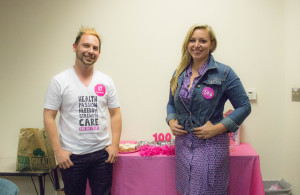Tags
Related Posts
Share This
Planned Parenthood Centennial Celebration

Photo courtesy of Underwood & Underwood – Library of Congress Prints and Photographs division, reproduction number LC-USZ62-29808
On Oct. 16, 1916, Margaret Sanger illegally opened the first public birth control clinic in the United States. The location in Brooklyn, NY provided medically accurate reproductive information for the cost of a single dime. Over the next five years, the clinic closed and reopened multiple times and Sanger spent time both in and out of prison. When offered freedom in exchange for the promise of discontinuing attempts to provide women with birth control access, Sanger accepted jail bars. After her sentence had expired, Sanger founded the American Birth Control League which ultimately changed its name to one still familiar in America: Planned Parenthood.
Connor Anderson, a Santa Fe organizer for Planned Parenthood of the Rocky Mountains—a regional branch of Planned Parenthood Federation of America—points out that while some things have not changed very much for Planned Parenthood, much has changed in America. “When Planned Parenthood began in 1916, women could not vote, sign contracts, have bank accounts, or divorce abusive husbands, and they did not have legal rights over or to their children,” Anderson says.
Anderson says that Planned Parenthood has not only expanded beyond birth control to provide accessible health care, but it also works with intersectional organizations and movements to provide equality to everyone despite their class or the nature of their injustice. “Obviously we still have work to do,” Anderson says. “It is our generation’s responsibility to continue the work of these early feminists and to change the cultural climate surrounding women’s reproductive health care and women’s sexuality. Planned Parenthood is a place for young activists to find their voice.”
On Oct. 16, 2016, PPRM celebrated the nonprofit organization’s centennial. A few days beforehand, a collaborative discussion was hosted on the past, present and future of reproductive care across New Mexico, Colorado, Nevada and Wyoming. Marshall Martinez, the public affairs manager for PPRM in New Mexico opened a dialogue by asking, “What do you want to see in the next 100 years? What is it that we need to do to provide the best healthcare…the best education, for our patients?” Martinez goes on to say that these are the questions PPRM asks itself when developing new ways to interact within local communities.

Marshall Martinez and Connor Anderson organize a get together to talk about the next 100 years of Planned Parenthood. Photo by Amaya Hoke
While Planned Parenthood began with and still provides medically accurate information and safe access to birth control and abortion services, the organization also offers preventive care which includes screening for sexually transmitted infections, pap smears, breast exams and now in PPRM’s region, Pre-exposure Prophylaxis, or PrEP, a medication that when taken as directed can reduce the risk of contracting HIV by 99 percent in high risk patients.
New Mexico’s clinics all have similar waiting rooms. Bright posters declaring “Get yourself tested!” are hung beside charts that break down the differences and similarities between the many birth control methods. Pamphlets sit beside magazines for patients to skim while waiting to be seen, explaining details of Intrauterine Devices, Depo Provera injections, Combined Hormonal Oral Contraceptives and more. Pamphlets of this nature were considered criminal literature in 1916 and led to several of Sanger’s many arrests.

Promotional poster for open discussion on the 100 year anniversary of Planned Parenthood provided by PPRM
Planned Parenthood was founded to meet needs women still have in modern America; to regulate the number of children they have and to possess body autonomy. “[Not being able to control how many children a woman had] created situations of immense poverty for some families,” Martinez says. “In others, [pregnancy] caused severe health complications…for mothers who couldn’t afford to be ill or severely injured because they [already] had families to care for.” Martinez, like many employees of PPRM, believes that Planned Parenthood has had a positive long term impact on communities across the country.
Planned Parenthood, along with all abortion providers in the United States, still faces some of the battles Sanger herself fought to keep clinics open. Laws have been created that limit access to abortion and challenge a woman’s right to safe and private abortion care. Twenty-three states mandate misleading and often inaccurate information be provided to anyone seeking an abortion. Anti-choice groups harass and threaten landlords that rent their property to clinics until they are forced to evict. And nearly one year ago, Nov. 27, 2015, an armed man entered a Planned Parenthood facility in Colorado Springs and opened fire.
Despite ongoing battles, staff at Planned Parenthood facilities remain dedicated and optimistic about the care that they provide. Martinez is excited to to see where the next century will take reproductive care. “We don’t know what’s next for Planned Parenthood as an organization,” he says. “But I’d like to think it’s a bold new world.”
Jackalope staff writer Amaya Hoke is an employee of Planned Parenthood of the Rocky Mountains.






 Jackalope Magazine is the student magazine of Santa Fe University of Art and Design. Building on the interdisciplinary nature of our education, we aim to showcase the talent of our university and character of our city.
Jackalope Magazine is the student magazine of Santa Fe University of Art and Design. Building on the interdisciplinary nature of our education, we aim to showcase the talent of our university and character of our city.
Recent Comments